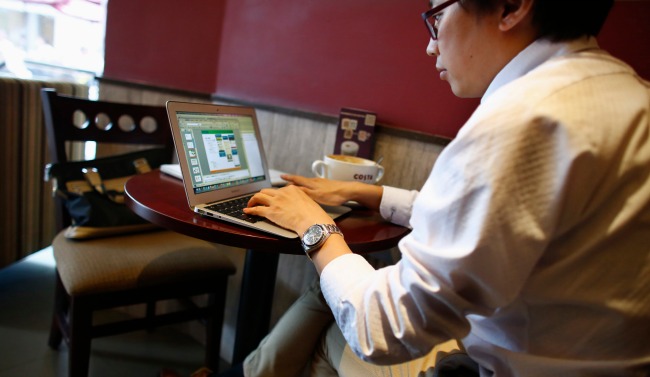How Internet Censorship Actually Works in China
Studies show that the government permits some dissent online—but strikes down hard on calls for collective action.

Carlos Barria/Reuters
The first week of October brings the National Day holiday in China, marking the anniversary of Mao Zedong’s founding of the People’s Republic in 1949. It’s a day of government-organized celebrations with military parades, musical concerts, and fireworks. But even though it’s a major holiday in a country called the People’s Republic, there’s one thing that will almost certainly not happen in the country: big events organized by the people themselves.
It’s no secret that the Chinese government dislikes mass protests. But a fascinating pair of studies led by political scientist Gary King uses rigorously observed patterns of censorship on Chinese social media to show just how systematically the Communist Party works to avoid grassroots gatherings of any kind.
King believes Internet censorship in China is the “most extensive effort to selectively censor human expression ever implemented.” The government’s Internet police force employs an estimated 50,000 people who collaborate with an additional 300,000 Communist Party members—and that’s not counting the employees that private firms must hire to review the content on their own sites. Over the phone, King told me that the effort is so large that “it’s like an elephant walking through a room.” Together with colleagues Jennifer Pan and Margaret Roberts, King was able to track and measure its footprints, gaining new insights into the Chinese Leviathan.
In the first study, the team built a network of computers that closely watched 1,382 Chinese websites, tracking new posts about a variety of topics over periodic intervals to see if and when they were censored. 11 million posts covering 85 topic areas, ranging in political sensitivity from popular video games to the dissident artist Ai Weiwei, were chosen for investigation alongside online chatter resulting from real-world events. In the second study, King and his team went undercover. They created fake accounts on over 100 social media sites, submitted posts to see which ones were censored, and even set up their own social media site in China.
Two points stand out among their findings. First, China’s censorship infrastructure is incredibly efficient: Objectionable posts are removed with a near-perfect elimination rate and typically within 24 hours of their posting. The authors write, “This is a remarkable organizational accomplishment, requiring large scale military-like precision.”
Second, King and his team found that Chinese censors focus on posts that refer to, instigate, or are otherwise linked to grassroots collective action such as protests, demonstrations, and even apolitical mass activities, and that the regime seems comparatively more comfortable with criticism of the government. For example, this passage was not censored:
The Chinese Communist Party made a promise of democratic, constitutional government at the beginning of the war of resistance against Japan. But after 60 years that promise has yet to be honored. China today lacks integrity, and accountability should be traced to Mao. [...] intra-party democracy espoused today is just an excuse to perpetuate one-party rule.
Meanwhile this sentence, which refers to a suicide bomber whose homes were demolished, was nixed:
Even if we can verify what Qian Mingqi said on Weibo that the building demolition caused a great deal of personal damage, we should still condemn his extreme act of retribution....The government has continually put forth measures and laws to protect the interests of citizens in building demolition.
This isn’t to say that the Communist Party is happy with criticism. Chinese people can still be punished for publishing dissent, especially if it gains traction: For example, a man in Shaanxi Province was recently detained for being retweeted 500 times on Sina Weibo. But to the extent that criticism is expressed in small ways, it is secondary to writing that might incite collective action.
King suggests at least two reasons for this. First, allowing some criticism might mollify citizens who want to blow off some steam, thereby keeping them from expressing these feelings more violently. Second, this relative leniency is a useful way for the central government to learn about problems that require attention. King cites the political scientist Martin Dimitrov, who argues that “regimes collapse when its people stop bringing grievances to the state”—because they no longer see the state as legitimate. Calls to collective action, however, are regarded as dangerous and are not tolerated at all—even when they have little to do with politics.
In all, these studies provide further evidence of technology’s basic amorality: Rather than being a net positive or negative, it merely amplifies underlying human forces. Says King, “Political actors in any country use whatever means of communication they have to advance their goals. If technology allows them to do it faster, they’ll use technology.”
“In some ways, it’s the same in America,” he continues. Large technology companies in the United States are required by law to monitor and censor illegal content such as child pornography, and, as recent revelations about NSA spying reveal, Washington has the ability to pressure businesses to get information it wants.
But the nature of government control of the Internet between the two countries is still different. King gave a recent example: A few days ago, the singer/actor Justin Timberlake tweeted that the first 150 people to join him at a nightclub would get in free. Hundreds of people lined up within minutes. King says, “That could never happen in China.”
